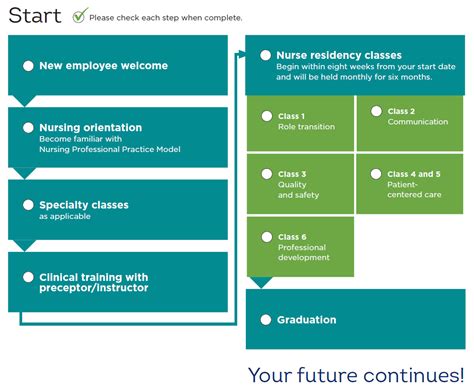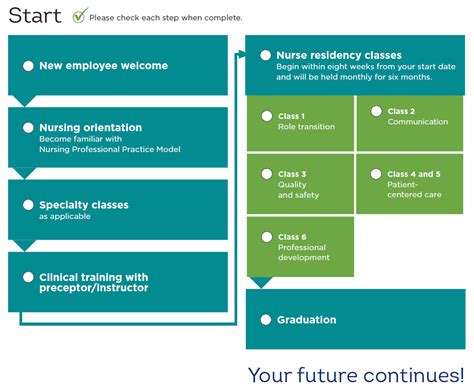Intro
Jumpstart your nursing career with RN nurse residency programs. Discover how these structured programs provide hands-on training, mentorship, and professional development. Learn about the benefits, curriculum, and eligibility requirements. Find the best RN residency programs to launch your nursing career and gain the skills and confidence to succeed in this rewarding field.
The nursing profession is one of the most rewarding and in-demand careers in the healthcare industry. As a registered nurse (RN), you have the opportunity to make a significant impact on patients' lives and contribute to the well-being of communities. However, transitioning from a nursing student to a confident and competent RN can be challenging. This is where RN nurse residency programs come into play. In this article, we will explore the importance of RN nurse residency programs, their benefits, and what to expect from these programs.
What are RN Nurse Residency Programs?

RN nurse residency programs are designed to support newly graduated RNs as they transition into their first professional nursing role. These programs provide a structured and supportive environment where new nurses can develop their clinical skills, build confidence, and learn from experienced professionals. Typically, these programs last from several months to a year and may be offered by hospitals, healthcare organizations, or academic institutions.
Benefits of RN Nurse Residency Programs
RN nurse residency programs offer numerous benefits to new nurses, including:
- Improved job satisfaction and reduced turnover rates
- Enhanced clinical skills and confidence
- Increased patient safety and quality of care
- Better adaptation to the healthcare work environment
- Opportunities for professional growth and development
- Mentorship and support from experienced nurses
How Do RN Nurse Residency Programs Work?

RN nurse residency programs typically consist of several components, including:
- Orientation and onboarding: New nurses receive an introduction to the healthcare organization, its policies, and procedures.
- Clinical rotations: Nurses participate in rotations across various units or departments to gain exposure to different patient populations and clinical settings.
- Mentorship: Experienced nurses provide guidance, support, and feedback to new nurses.
- Education and training: Nurses receive ongoing education and training on clinical skills, patient safety, and quality improvement.
- Evaluation and feedback: Nurses receive regular evaluations and feedback on their performance to help them improve and grow.
Types of RN Nurse Residency Programs
There are various types of RN nurse residency programs, including:
- Hospital-based programs: Offered by hospitals and healthcare systems, these programs focus on developing clinical skills and adapting to the hospital environment.
- Community-based programs: Focus on developing skills in community health settings, such as clinics, public health departments, and home health agencies.
- Specialty-based programs: Focus on developing skills in specific clinical areas, such as pediatrics, oncology, or critical care.
- Academic-based programs: Offered by nursing schools and universities, these programs focus on developing research and educational skills.
What to Expect from RN Nurse Residency Programs

When participating in an RN nurse residency program, you can expect:
- A supportive and structured environment
- Opportunities for professional growth and development
- Mentorship and guidance from experienced nurses
- Ongoing education and training
- Regular evaluations and feedback
- A chance to build confidence and competence in your nursing skills
How to Apply for RN Nurse Residency Programs
To apply for RN nurse residency programs, you typically need to:
- Meet the program's eligibility requirements, such as having a recent nursing degree and a valid RN license
- Submit an application, which may include a resume, cover letter, and transcripts
- Participate in an interview or assessment process
- Receive acceptance into the program and complete any necessary paperwork or orientation
Conclusion: Launch Your Nursing Career with RN Nurse Residency Programs

RN nurse residency programs offer a valuable opportunity for new nurses to launch their careers with confidence and competence. By providing a supportive environment, mentorship, and ongoing education, these programs help new nurses develop the skills and knowledge needed to succeed in the nursing profession. If you're a new nurse looking to start your career on the right foot, consider applying for an RN nurse residency program today.
We invite you to share your thoughts and experiences with RN nurse residency programs in the comments below. Have you participated in a nurse residency program? What benefits did you gain from the experience? Share your story and help inspire others to launch their nursing careers with confidence.
What is the typical duration of an RN nurse residency program?
+RN nurse residency programs typically last from several months to a year.
What are the eligibility requirements for RN nurse residency programs?
+Eligibility requirements may vary depending on the program, but typically include having a recent nursing degree and a valid RN license.
What types of RN nurse residency programs are available?
+There are various types of RN nurse residency programs, including hospital-based, community-based, specialty-based, and academic-based programs.
